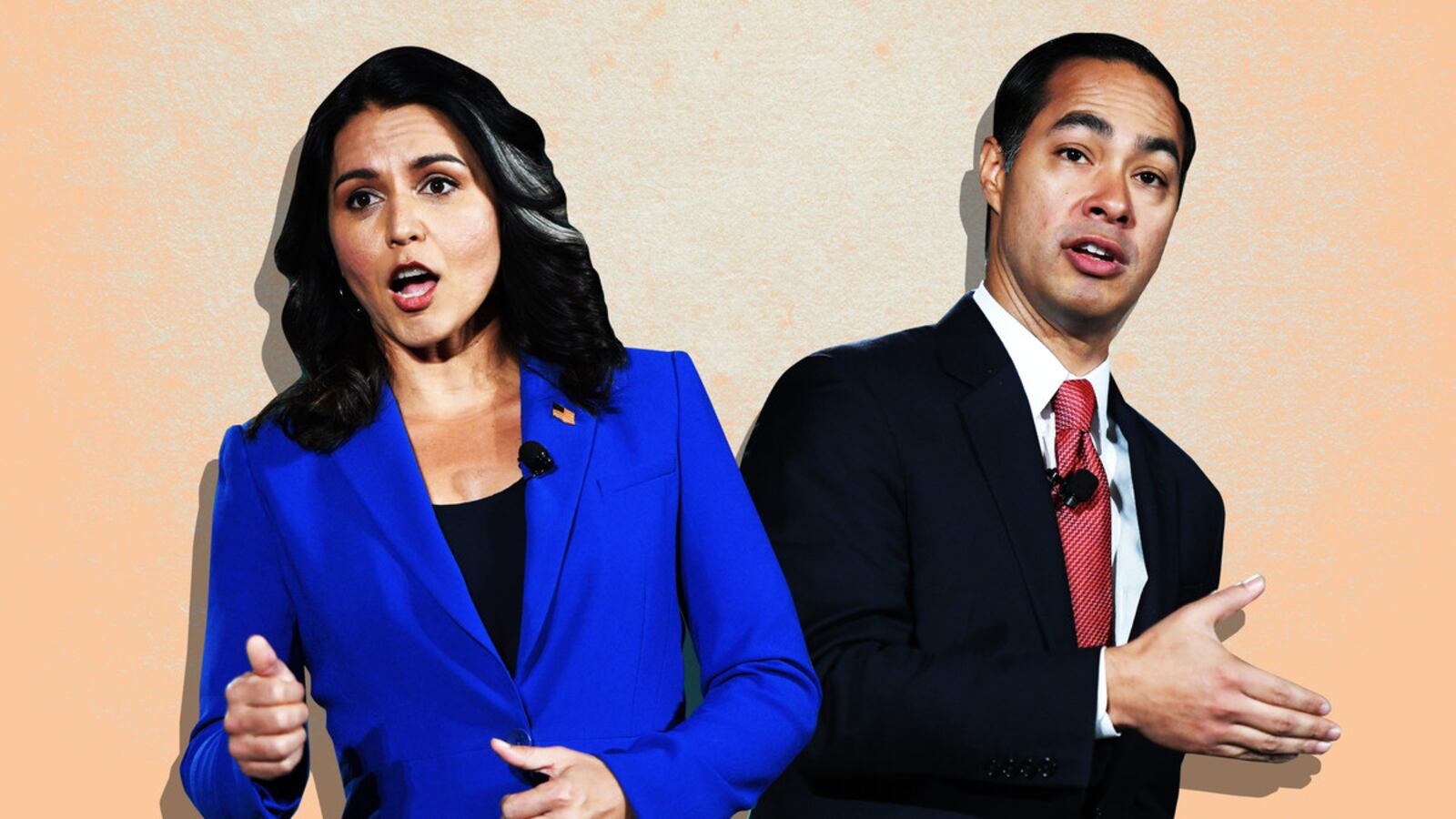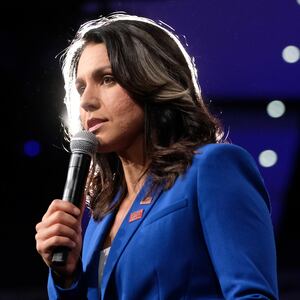When comparing the public personae of the obstinately large 2020 Democratic presidential field, there are few candidates with less overlap than former Housing and Urban Development Secretary Julián Castro of Texas and Rep. Tulsi Gabbard of Hawaii.
Castro is passionate about policy—climate policy, immigration policy, housing policy—and one of the field’s most vocal advocates for minority voter communities, which have often felt neglected by the Democratic Party that relies on their support. Gabbard’s passion, meanwhile, is iconoclasm. The Hawaii congresswoman has primarily styled herself as a single-issue candidate, focusing on what she sees as the failures of both Democrats and Republicans to avoid imperialist adventurism overseas, raging against the “war machine” that, she claims, controls both parties.
But the two very different candidates face a very similar problem: the reality that they will miss out on their second presidential debate on Thursday—and that both face polling numbers in early-voting states low enough to be borderline nonexistent. Their response to that problem has taken shape in a similar way: by attacking the nomination process, the frontrunners, and media outlets from their respective perches in the Democratic Party’s left and right wings.
In recent weeks, Castro has blasted the Democratic National Committee, media outlets, and the entire presidential primary process as having “pushed aside women and candidates of color” in favor of an entirely white top tier of candidates. That lack of diversity, Castro has said repeatedly, is to the party’s own peril, leading to allegedly weaker candidates—whom he’s happy to name—and he has declared that if the party won’t move to change Iowa’s first-in-the-nation status, “then why in the hell are we Democrats in the first place?”
Gabbard, for her part, is dovish on foreign policy but not so much on her Democratic opponents. In recent weeks, Gabbard has accused Sen. Kamala Harris (D-CA) of trafficking “in lies and smear and innuendoes,” has accused South Bend Mayor Pete Buttigieg of wanting to invade Mexico to fight drug cartels, and has accused Hillary Clinton—who isn’t even running for president—of being “the queen of warmongers, embodiment of corruption, and personification of the rot that has sickened the Democratic Party.”
Although neither candidate qualified for Thursday’s debate in Los Angeles, their increasingly vocal condemnation of the Democratic field’s makeup, policy priorities, and potential nominee are hitting their targets. But while their targets and tactics are increasingly similar, Castro and Gabbard couldn’t be more dissimilar in their motivations, political observers told The Daily Beast.
“Their reasons for still being in are the exact opposite,” one Democratic operative told The Daily Beast. “Castro is trying to demonstrate something to the party—and also demonstrate something to the communities that he comes from—about what Democrats can do in the future, whereas I think Gabbard is just trying to set herself up for something financially in the future, because where else does she have to go from this?”
“With Gabbard, there’s something about her that reads as being not quite in line with other politicians—not just politically but behaviorally,” said political communications consultant Liz Mair. “She’s willing to go around and blow things up, ironically.”
Castro, conversely, “doesn’t necessarily have the nasty vein in him,” Mair said—and when he does put the heat on opponents, it comes across as rooted in policy differences and deeply held frustrations with the nomination process, rather than planning for a post-campaign job.
The “attack dog” position of recent weeks isn’t completely new to either candidate. Gabbard, a veteran of the Iraq War and now a vocal critic of interventionist foreign policy, spent years on Fox News criticizing President Barack Obama’s foreign policy, and her increasingly bitter feud with Clinton, who implied that the Hawaii congresswoman is favored by the Kremlin, is rooted in years-old critiques of Clinton’s tenure at the State Department.
Castro, as well, was pegged as a scrappy debater early in the campaign, when he and former Texas congressman Beto O’Rourke squared off on immigration policy in an exchange that Mair called “probably the most brutal thing I’ve seen on a debate stage” this cycle. But a similar exchange a few months later led to Castro being dubbed a bully after he questioned former Vice President Joe Biden’s memory during a debate over health-care policy in September, suggesting that the 77-year-old frontrunner was “forgetting what you said just two minutes ago.”
“This is why presidential debates are becoming unwatchable,” interjected South Bend Mayor Pete Buttigieg. “This reminds everybody of what they cannot stand about Washington.”
Castro later denied that he was implying anything negative about Biden’s age, but the former veep’s team made it clear that even perceived cheap shots would rebound onto whoever tried to lob them in the future.
“Attacking Joe Biden is not the way to advance yourself in the polls,” said Kate Bedingfield, Biden’s deputy campaign manager and communications director, after that exchange. “Candidates are seeing that and learning that lesson.”
For Castro and Gabbard, this prediction has proven largely true. Putting Clinton on blast has netted Gabbard a much-needed boost in fundraising—as well as the apparent endorsement of President Trump’s campaign, less helpful in a Democratic primary—but a marginal uptick in the polls failed to win her a spot on Thursday’s debate stage. While Castro’s recent criticism of media bias against candidates of color led to his best single-day fundraising numbers this quarter, it has still failed to elevate his candidacy, and he’s now missed two Democratic debates in a row.
Many of the attacks, of course, have backfired. Castro alienated some voters who felt that he went too negative too quickly, and royally ticked off the Iowa Democratic Black Caucus, which accused him of erasing voters of color in the Hawkeye State.
“Unfortunately, when we find individuals who do not garner the support they were striving for, the question arises about the status of Iowa being the first in the nation caucus state,” the Iowa Democratic Black Caucus said in a statement last week. But the real question, the organization said, is if Castro were polling in the top three candidates, “would this even be an issue?
Even the DNC has begun pushing back on Castro’s accusations that its primary calendar and debate entry rules put candidates of color at a disadvantage.
“This has been the most inclusive debate process with more women and candidates of color participating in more debates than billionaires,” DNC spokesperson Xochitl Hinojosa said in a statement responding to Castro’s comments, noting that “nobody who has failed to reach 4 percent at this point in the race has gone on to be the nominee, and our debate criteria reflects that.”
If the motive is no longer exclusively the pursuit of a nomination that looks increasingly out of reach for both candidates, political observers told The Daily Beast, there is still a utility in Castro and Gabbard’s increasingly pointed broadsides against the Democratic establishment.
For Castro, continued presence in the race—and a sharper focus on the issue of race—is an opportunity to change the party in the future, which he almost explicitly admitted during a recent town hall in Iowa when he was asked if his open opposition to the state’s place in the primary calendar might harm his political prospects down the road.
“I’m 45 years old,” Castro said. “If it’s a catastrophe to bring this up, if I ever wanted to run again in the future, the same thing applies. So I thought long and hard about whether I wanted to bring this up, and I do, because it needs to be said.”
Castro has also denied that his increasing attacks against Buttigieg, a frequent target of Castro’s, are about anything more personal than his poor polling numbers among black voters.
“This is nothing personal against Mayor Buttigieg, but this is about vetting somebody to become president of the United States,” Castro said last month. “I just don’t think the argument’s there.”
Beyond hoping to steer Democratic voters toward a more winning coalition, a Democratic strategist told The Daily Beast, Castro is likely trying to demonstrate that the fact that “white guys from the Midwest will get more attention and coverage than anybody else” shouldn’t lead to the exclusion of other candidates.
“He’s trying to demonstrate, like Kamala Harris was or like Cory Booker is, that people who are from their background can be legitimate candidates for president of the United States,” the strategist said. “There’s a lot more to why he’s staying in than somebody like Gabbard.”
Castro’s plans during the debate will follow a similar vein, campaign communications director Sawyer Hackett told The Daily Beast.
“We plan to lift up issues that will go unaddressed on stage and highlight Secretary Castro’s leadership on the issues that are brought up,” Hackett said.
As for where Castro sees himself ending up after this race’s conclusion, Hackett said the former HUD secretary is “focused on running for president and nothing else.”
For Gabbard, the consensus among political consultants and staffers at rival campaigns is that any candidate willing to wage a bitter public feud with her own party’s most recent nominee—and who has already declined to pursue her own re-election if she fails to win the nomination—has a stronger taste for lucrative television contracts than for high elected office.
“For her, there’s clearly a personal, long-term financial aspect here—whether it’s Fox News, books, continuing to grow her small but vocal social media presence,” said one Democratic political consultant who is not involved with any active presidential campaign. “It’s just really obvious that she’s in it for some sort of monetary gain and doesn’t care that her surge was fueled by Russian trolls.”
Among Democrats, “there’s just not much appetite in the party for what she’s selling,” said Tim Miller, a Republican communications consultant who, like several people The Daily Beast spoke with, likened her to former congressman Ron Paul in her use of the presidential campaign to push a specific issue set while raising her national profile. “I think her plan is simply all attention is good attention and to see what comes her way—I don’t put much stock in the disavowals of what she might do in the future.”
Gabbard’s announcement last week that she would refuse to participate in the Los Angeles debate even if she did qualify made it even clearer that winning the Democratic primary was no longer her top priority, the Democratic political operative told The Daily Beast, unless her continued presence on the ballot could help spoil the race for another candidate.
Similarly, her decision not to seek re-election to Congress may have been less about dedication to winning the White House than about the political realities in Hawaii, where her increasing coziness with the Trump administration was an increasing liability. Without a congressional escape hatch, her professional future may rely on going out in flames of glory.
“She could easily end up getting some kind of Fox News contributorship,” Mair said. “She and Trump are probably a lot closer on foreign policy than probably anybody else that’s going to feature in this field.”
“It’s not like she has a ton of places to go after this,” the operative said, likening Gabbard’s position in the current Democratic Party to perennial candidate and convicted fraudster Lyndon LaRouche. “She can do remote hits from Hawaii for the next five years—who wouldn’t want to do that?”







